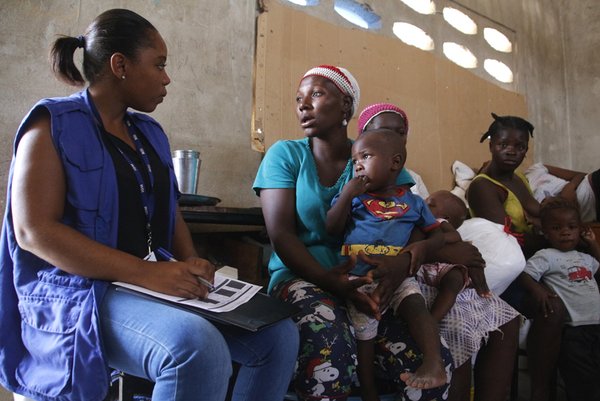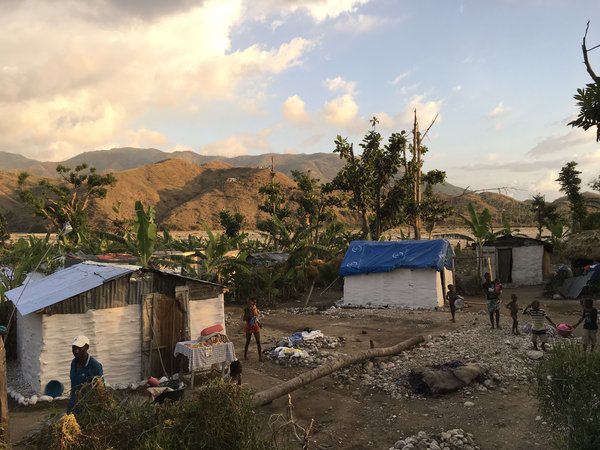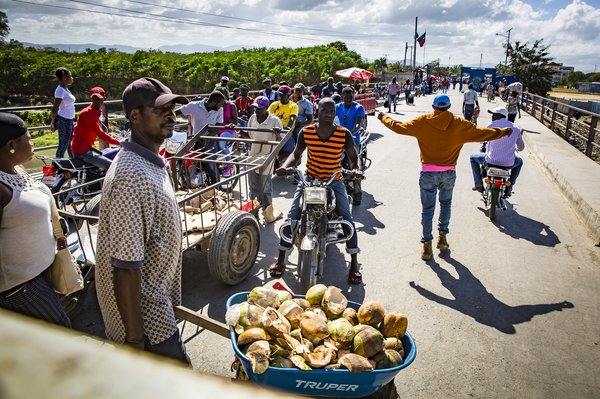
Haitian waves Haitian flag in Santiago, Chile. Demonstration for a new immigration law. Photo via Sebastian/Flickr. CC BY-NC-SA 2.0
In January 2023, US President Joseph Biden announced a new, multi-pronged effort to curb undocumented migration at the US-Mexico border. The new policy includes the immediate removal of undocumented entry into the US from Mexico, expansion of a parolee initiative (piloted among Venezuelans and resulting in a nearly 70% decline in irregular border crossings over a one-month period), and a threefold increase of the refugee resettlement program. According to Biden, the expanded parolee initiative will allow up to 30,000 people per month from Cuba, Haiti, Nicaragua and Venezuela, to enter the US and obtain work authorisation for two years. Applicants must identify a sponsor with US citizenship or Permanent Resident status. The streamlined online application process does not require an embassy interview and decisions are made expeditiously. The refugee resettlement program will accept up to 20,000 refugees from Latin America and the Caribbean in 2023 and 2024. The policy has drawn criticism from immigration advocates who argue that the restrictions placed on asylum seekers fleeing persecution are unconscionable.
Haitian migration in Latin America
The reaction among Haitians across the Americas ranges from hope to suspicion. For many seeking to migrate to the US, it seemingly presents a legal pathway for migration, offering an alternative to the increasingly popular, yet dangerous, migration route across South and Central America through the Darien Gap that many Haitians on the move have followed en route to the US. Why would Haitians take such a circuitous route to the US?
The truth is that migration has long been a strategy of survival for Haitian households dating back to the 1970s. After the 2010 earthquake, Brazil and Chile emerged as choice destinations due to their favourable migration policies. Between 2008 and 2018, the Haitian population in Brazil rose from less than one hundred to over 140,000. Between 2012 and 2020, Chile experienced a similar surge in its Haitian population rising from 2,000 to 182,000.
For more than a decade, Haitians, once a small to non-existent presence in South America, have migrated to, transited through and onward to multiple countries on the continent. However, as the increasing presence of Venezuelans across South America gave rise to xenophobia and other unfavourable conditions such as the 2015-2016 economic downturn in Brazil and 2017 election of Sebastián Piñera’s conservative government in Chile came into play, the welcome mat for Haitians was withdrawn. Beginning around 2016, some Haitians began to “pran wout lan [take the migration trail]” northwards toward the US-Mexico border. Some made a temporary or permanent home in Mexico while others took their chances crossing the US border. While it is unknown how many have successfully settled in the US, it is estimated that between 2021 and 2022 approximately 25,000 Haitians were subject to Title 42 expulsions. Biden’s announcement, thus, raised the hopes of all Haitians with a desire to leave their homeland which currently faces multiple crises including: a constitutional crisis, gang violence, the collapse of state security and rule of law institutions, rising inflation, the ongoing investigation of the former President’s assassination and the ever-present threat of disaster.
Hope and conflict: reactions from Haiti and its diaspora
The Biden Administration’s announcement spread like wildfire via social media. The brevity of some postings misrepresented the policy as benefitting 30,000 Haitians (as opposed to “up to 30,000” from four countries, including Haiti) per month. Whether applications will be approved equally across the four countries or on a case-by-case basis remains to be seen. If the latter is the case, there are legitimate concerns based on past US policies toward Haitian migration that they may benefit the least from these policy changes.
Despite these concerns, the announcement was met with much enthusiasm by aspiring migrants armed with the hope of legal entry to the US. Comedians found ample content in Biden’s new policy. Videos of individuals practicing or teaching English are widely circulating across Haitian social media. One company capitalised on the occasion to promote its kremas, a coconut-based cocktail, as the perfect gift for President Biden. Demand for Haitian passports has gone up and the price doubled. Images of a handful of law enforcement officials trying to manage large, unruly crowds outside of the Immigration Bureau in Port-au-Prince circulate as intermediaries profit off those willing to pay an additional fee to ensure or expedite passport services.
Haitians’ newfound hope also ignited family conflicts as US-based relatives and friends find themselves inundated with requests for sponsorship. In one comedic interpretation of the new policy, an older woman implores a relative for sponsorship: “Americans say that everyone in Miami should file for their families […] everyone in Miami should file for 60 [family members…] do me a favour and file for me […].” An obvious exaggeration of the possible yet steeped in the current Haitian reality. Members of the Haitian diaspora have reached out to one another, some in disbelief others in distress, to compare numbers: “How many requests [for sponsorship] have you received?”
The concerns are manifold: Is this policy sustainable? What does temporary parolee status imply and what are the consequences for sponsors if migrants violate them or the length of their stay? There are also practical issues: how many family members (or friends) can they afford to sponsor, if any? Whose application should they support? Many are perplexed by requests for sponsorship from distant family members (some they have never met) and friends they never deemed close enough to make such a request.
In another poignant social media post, a young man argues that this new policy is unfair to those whose immigration applications were approved then delayed by the COVID-19 pandemic. As family members in the US try to explain their financial inability to sponsor (some) relatives or friends, ponder the risks associated with sponsorship (e.g., mixed status households), reject requests outright or adopt a strategy of avoidance by going “radio silent”, bonds are weakened and conflicts emerge.
The downside of the new migration policy: potential human capital loss in Haiti
The Biden Administration has been criticised by Republicans and Democrats alike for its failure to address the influx of migrants at the US-Mexico border. Whereas this policy provides a temporary solution, it ignores the root causes, violence and inequality rooted in the colonial legacies of the region, which US policies have time and again exacerbated by supporting the status quo. This is the case in Haiti. The policy may reduce the influx of migrants from the US-Mexico border, but it will only re-route, not deter, them.
US policymakers’ and the media’s preoccupation with this migrant crisis obscures the fact that as conditions worsened at home, Cuban, Haitian, Nicaraguan and Venezuelan elite and professionals were already settling in the US in significant numbers. While their resettlement is either welcomed or viewed with indifference, it comes at a significant cost to their homelands. Since the dictatorship in the 1960s, Haiti has suffered waves of human capital losses to the US, Canada, France and newly independent countries in sub-Saharan Africa. The 2010 earthquake was arguably the most recent mass exodus of human capital, a reality Haiti continues to suffer to date. This new policy will ensure that many more of Haiti’s best and brightest, those who would be sacrificing too much as undocumented migrants, will leave. This loss may cause irreparable harm to a country standing at the crossroads of multiple crises, struggling to develop a functioning democracy and whose institutions are extremely fragile.
Failure to address the root causes of migration in the Western hemisphere will only prolong the crisis. The short sightedness of such policy approaches lies in the fact that as the US depletes these nations of their (potential) political, economic and social leaders, it emboldens other questionable forces to take the helm, further exacerbating the regional migration crisis the US is so desperate to temper.



